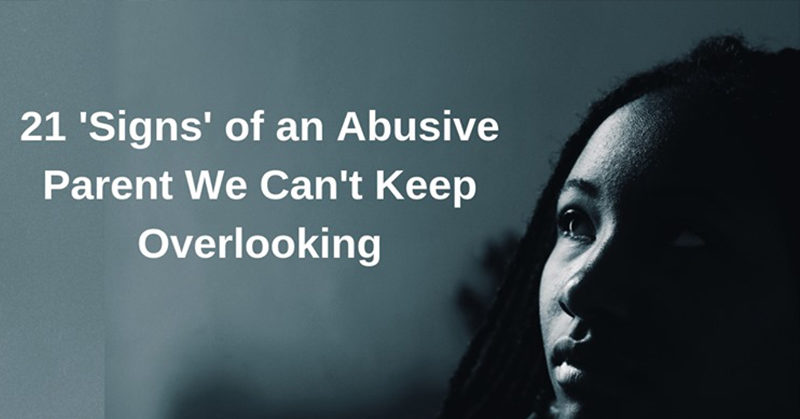The signs of abuse can often be hard to see, especially when the abuser is a parent. Not only may people outside of the situation not see the signs, but it can be years before the child recognizes the abuse. These are some of the signs that you or someone you know has an abusive parent.
21 Signs of an Abusive Parent
We tend to think of abusive parents as purely physical, however emotional and mental abuse is just as common, if not more so, and have a negative impact on a child’s mental health long into adulthood. These are just some of the signs that either yourself or someone you know is a victim of parental abuse.
- Using basic necessities as leverage: Using necessities as a way to control – whether by withholding or threatening to withhold them or by saying “At least I give you “x” thing” as a way to make the child feel bad or to justify the parent’s behavior. Basic necessities include: Food, Water, Shelter, Clothes, Hygiene products. This can also be the lack of physical abuse (“At least I don’t beat you!”).
- Parentification: This is a term for when a parent treats their child more like an adult friend and lies heavily on them for emotional support. It is almost a role reversal, where the child is now taking care of the parent’s needs instead of the other way around.
- Child Favoring: Parents are supposed to love their children equally and for the unique qualities each of them has. Favoring one over the other damages both children.
- Teasing and Humiliation: When a parent’s teases, shames, and humiliates their child incessantly, however, this becomes psychologically damaging.
- Denying Privacy: Disguised as wanting to “protect” their child, not giving them any privacy shows a complete lack of trust and disregard for their right to their own space.
- Threatening Physical Violence: Though the parent never actually goes through with that threat, it is a fear tactic that has negative effects on the child.
- Forced Competition Between Siblings: This is the idea that parental love must be earned rather than freely and equally given. In this case, siblings are put against one another to compete for their parents’ love.
- Religious Shame: Using religion to shame a child does double damage.
- Emotional Neglect: This is not what a parent does, but more what they don’t do. Even if they are physically present, they are mentally or emotionally absent, perhaps they even completely ignore their children.
- Conditional Love: Only showing your child love and affection when they do something good and denying them of it when they are “bad” teaches the child that love must be earned.
- Using a child as leverage against the other parent: Marital problems should always be dealt with between the parents and not in front of their children.
- Expecting Perfection: No matter how smart, talented, or hard-working a child is, they will never be perfect.
- Guilt-tripping: Being constantly made to feel guilty by parents or other adult authority figures stunts a child’s ability to learn what healthy boundaries are.
- Blaming: This is when a parent always plays the victim and blames the child for everything that goes wrong.
- Always speaking for the child: Children should be taught to speak up for themselves and also made to feel safe to express their own needs, fears, and desires.
- Verbal Abuse as Discipline: Constant verbal abuse, ridicule, and yelling at a child makes them more likely to develop personality disorders as they grow older.
- Emotion-Shaming: Telling a child to stop crying or that they are being too sensitive teaches them that their feelings aren’t valid.
- Violating Age-Appropriate Boundaries: It is not a parent’s “right” to deny a child of the boundaries they wish to set for themselves.
- Invalidating a Child’s Struggles: This often comes in the form of “back in my day, we had it so much worse…”.
- Stealing from the Child: Stealing both items and money from their child because they are the parent and have a “right” to it is wrong.
- Forcing a child to be who the parent wants: Most parents want…






